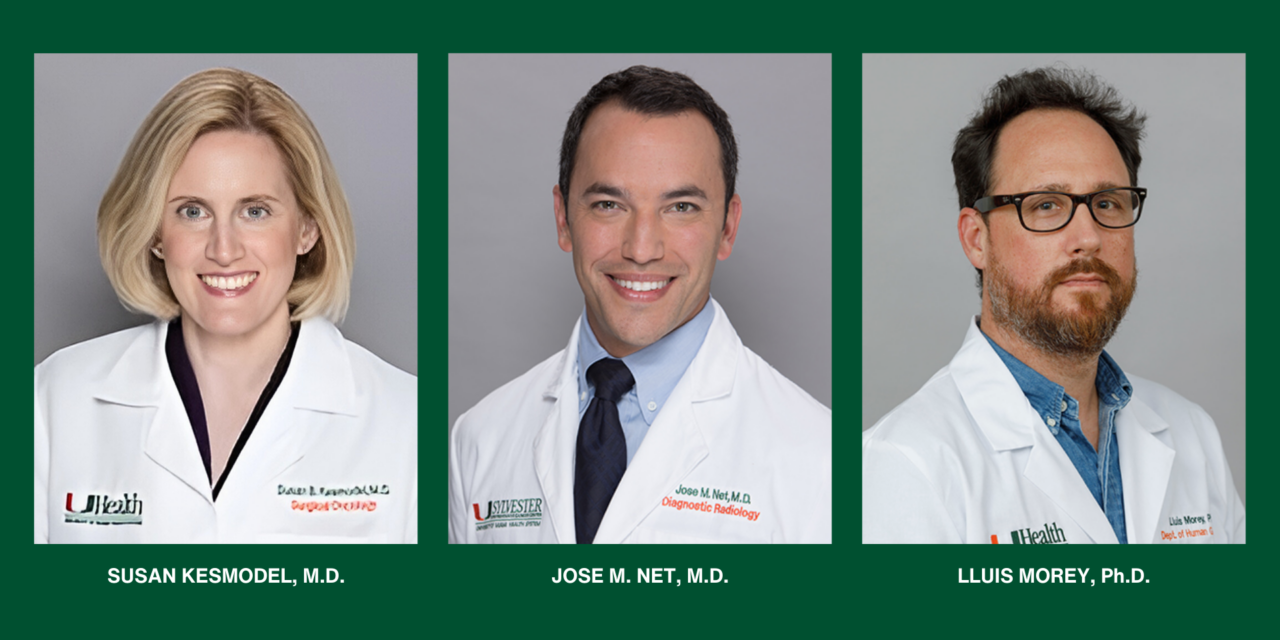About 42,000 women in the United States die each year of breast cancer and experts at Sylvester Comprehensive Cancer Center, part of University of Miami Health System, strive to reduce those numbers. Their arsenal consists of sophisticated imaging technology, improved surgical procedures, a program for high-risk women, and research into the cellular mechanisms of cancer.
Sylvester experts attack breast cancer on multiple fronts to advance cures, reduce, racial disparities and save lives. New imaging and surgical techniques help.
Breast cancer affects one in eight U.S. women. Sylvester has breast cancer survivors available for interviews as well as these experts who offer ideas for news stories …
Susan Kesmodel is the Director of breast surgical oncology at Sylvester and Co-Leader of the Breast Site Disease Group. She sees opportunities for better use of surgery.
“We are seeing a de-escalation of surgery for breast cancer. In many women with early-stage breast cancer, mastectomy is not necessary and long-term survival is equivalent with lumpectomy. In some cases where we have multifocal or multicentric breast cancers we can do two lumpectomies with radiation and patients do not necessarily need a mastectomy,” – said Kesmodel.
She added:
- Surgeons increasingly look for options besides mastectomy for breast cancer.
- Lymph node surgery, which is usually performed in patients with breast cancer, has changed to reduce node removal and decrease risk of lymphedema.
- Breast cancer surgery is not one-size-fits-all but is increasingly tailored to the patient based on extent of the disease and tumor characteristics.
- Cosmetic surgery has improved dramatically. Women can now receive breast reconstruction during cancer surgery with lumpectomy or mastectomy.
Jose Net is the vice chair of Clinical Operations and director of the Division of Breast Imaging at Sylvester. He seeks to leverage the best imaging technology to detect cancer.
“Routine mammographic screening is the best way to minimize your chance of dying of breast cancer. Early detection can help find tumors that are smaller, haven’t spread outside the breast and are easier to treat,” – said Net.
He added:
- Patients need to know their breast density, one indicator of increased cancer risk. The FDA now requires patients receive this information; Sylvester has provided it for 13 years.
- Sylvester carefully screens patients for risk. Those deemed high risk route to the Breast Cancer Assessment Risk Evaluation (CARE) Clinic for focused and personalized care.
- Sylvester performs 31,000 mammograms annually, using the best imaging technology available.
- Sylvester is evaluating AI tools for patients to better assess lesions that may be cancerous.
Lluis Morey is a member of Sylvester’s Cancer Epigenetics Program and associate professor at the Human Genetics Department at University of Miami.
He studies how epigenetic mechanisms regulate resistance to current therapies. He wants to find new therapeutic targets for head and neck carcinomas and breast cancer.
“Most cancers respond poorly or become resistant to current treatments, such as triple negative breast cancer. Why is that? There is a critical need to identify molecular and biochemical pathways responsible for cancer growth so we can develop new therapies that revert the epigenome of the cell to a normal state. We hope this will be the next wave and standard of care,” – said Morey.
He added:
- Of a handful of breast cancer variants, most are not aggressive and have a 90% survival rate due to treatment. Early detection is key.
- Understanding stem cells is important because if you identify and kill them, you might stop a tumor from growing.
- Breast cancer deaths have declined 40% the past few decades, but a mortality gap persists between Black and white women – a priority for Sylvester in highly diverse South Florida.
- Sylvester excels by extensive collaboration between researchers, surgeons and clinicians.
Other posts featuring Sylvester Comprehensive Cancer Center.


